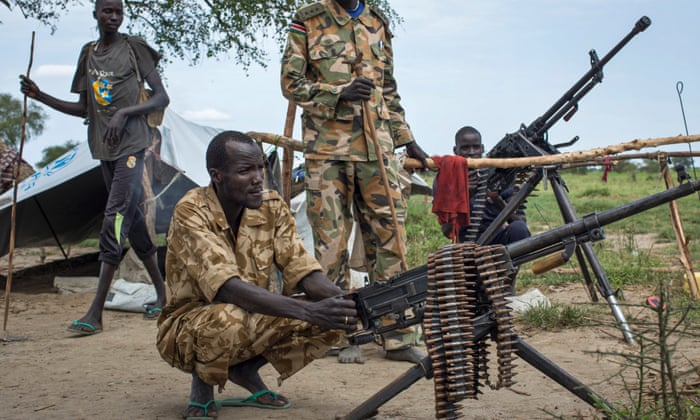
Opposition soldiers at Majieng, near Bentiu town in September 2014 | Credit | Matthew Abbott/AP
The government is finding it difficult to graduate forces at the training centers due to a lack of firearms, the minister of information says.
“How do we graduate them? Should we graduate them with the sticks on which they were trained?” Asks Michael Makuei.
The government spokesperson stated that the government does not have weapons to give to the expected unified forces.
He said this is due to the government’s inability to purchase arms after the United Nations Security Council imposed an arms embargo on South Sudan.
The European Union and the United States have also placed several sanctions on individuals in South Sudan.
There are thousands of SSPDF, SPLA-IO and Opposition Alliance forces in various cantonment camps across the country, some of whom have chosen to leave the camps over the graduation.
They underwent training and have been waiting for their graduation and deployment since 2019.
“Our economic situation is bad but even if we had the money, we will not be in a position to buy all these arms because of the arms embargo,” Makuei told Eye Radio on Thursday.
According to a report, the estimated total number of guns (both licit and illicit) held by civilians in South Sudan is 1,255,000 in 2017 and
3,000,000 in 2013.
Besides, the defense forces of South Sudan are reported to have 351,500 firearms.
Sicknesses and hunger are part of the training
Some of the soldiers declared that their colleagues left the cantonment and training camps due to lack of food, logistical, and medical supplies.
Also read: Over 50 cadets die while undergoing training at Rajaf
But Michael Makuei insisted that the harsh conditions at the training camps should also be viewed as part of the training.
“If you are talking of hunger and sickness, then this cannot be an excuse for a soldier to desert. This is even part of the training. How to persevere is part of the training,” Makuei argued.
Chapter two of the revitalized peace agreement requires the cantonment, screening, and training of 83,000 Necessary Unified Forces to safeguard the peace deal.
The peace deal stipulates that unifying the forces will provide security guarantees for the transitional government of national unity, unlike in 2016 when the forces were divided.
Support Eye Radio, the first independent radio broadcaster of news, information & entertainment in South Sudan.
Make a monthly or a one off contribution.
Copyright 2024. All rights reserved. Eye Radio is a product of Eye Media Limited.